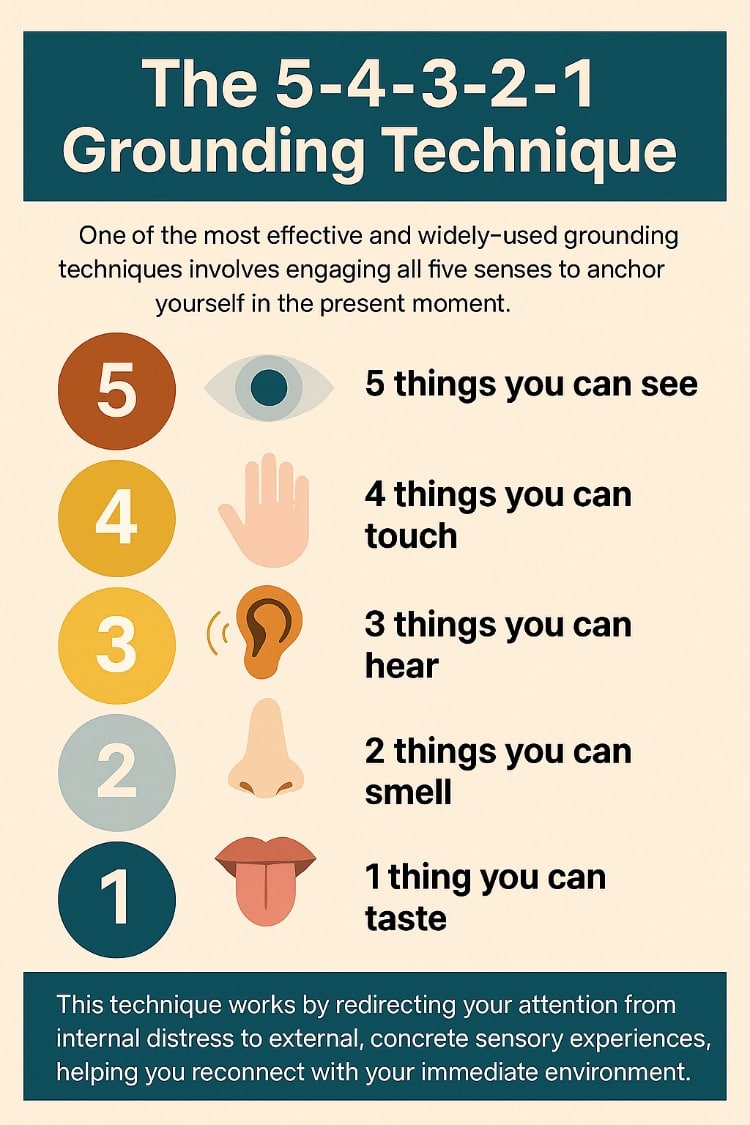Dissociation can feel like being disconnected from your body, thoughts, or surroundings—as if you’re watching your life from outside yourself or experiencing the world through a fog. While dissociation is a natural response to trauma or overwhelming stress, it can interfere with daily functioning and leave you feeling lost or detached. At D’Amore Mental Health, we understand how frightening and disorienting dissociative episodes can be, and we’re here to help you develop effective strategies to reconnect with the present moment.
If you’re experiencing dissociation, know that you’re not alone, and there are practical grounding techniques that can help you feel more anchored and present in your body and environment.
Understanding Dissociation
Dissociation exists on a spectrum, from mild experiences like daydreaming to more severe episodes where you might feel completely detached from reality. According to the National Institute of Mental Health, dissociative disorders affect approximately 2% of adults, though milder forms of dissociation are much more common. Common dissociative experiences include:
- Feeling disconnected from your body or emotions
- Experiencing the world as unreal or dreamlike
- Having gaps in memory or losing track of time
- Feeling like you’re watching yourself from outside your body
- Emotional numbness or feeling “empty”
- Difficulty concentrating or staying present
These symptoms often develop as a protective mechanism, helping your mind cope with overwhelming situations or trauma. However, when dissociation becomes frequent or interferes with your daily life, professional support can be invaluable. The American Psychological Association notes that dissociation is often linked to traumatic experiences and can be effectively treated with appropriate therapeutic interventions. Understanding trauma and trauma responses is an important part of recognizing why dissociation occurs and how it can be addressed.
The 5-4-3-2-1 Grounding Technique
One of the most effective and widely-used grounding techniques involves engaging all five senses to anchor yourself in the present moment. This technique is recommended by mental health professionals and is supported by research on mindfulness-based interventions for trauma and dissociation:
5 things you can see: Look around and identify five specific objects. Notice their colors, shapes, and details. Describe them to yourself in detail.
4 things you can touch: Feel different textures around you—the smoothness of your phone, the roughness of a wall, the softness of your clothing, or the coolness of a water bottle.
3 things you can hear: Listen carefully to sounds in your environment—perhaps traffic outside, the hum of air conditioning, or birds chirping.
2 things you can smell: Notice any scents present—coffee, cleaning products, fresh air, or even the absence of smell.
1 thing you can taste: This might be lingering flavors in your mouth, a mint, gum, or simply the taste of your saliva.
This technique works by redirecting your attention from internal distress to external, concrete sensory experiences, helping you reconnect with your immediate environment.
Physical Grounding Techniques
Physical grounding techniques help you reconnect with your body and the present moment through movement and sensation:
Temperature Techniques
- Hold ice cubes or splash cold water on your face
- Take a warm shower or bath
- Step outside to feel the air temperature on your skin
- Hold a warm cup of tea or coffee
Movement-Based Grounding
- Stretch your arms, legs, or neck
- Do jumping jacks or push-ups
- Practice deep breathing with intentional body awareness
- Walk barefoot on different surfaces (grass, carpet, tile)
Pressure and Touch
- Press your feet firmly into the ground
- Squeeze and release your fists
- Hug yourself or wrap yourself in a weighted blanket
- Press your back against a wall and feel the support
Cognitive Grounding Strategies
Mental grounding techniques help redirect your thoughts and focus your mind on concrete, present-moment information:
Naming and Describing
- Name your current location, the date, and time
- Describe your surroundings in detail
- List items in a specific category (animals, colors, foods)
- Count backwards from 100 by sevens
Memory and Facts
- Recite your personal information (name, address, phone number)
- List facts about yourself or your family
- Recall details about your favorite movie, book, or song
- Name your favorite places you’ve traveled or want to visit
Planning and Organizing
- Make a mental list of tasks for tomorrow
- Plan a meal you’d like to cook
- Organize your schedule for the upcoming week
- Think through the steps of a familiar routine
Emotional Grounding Techniques
When dissociation involves emotional numbness or overwhelming feelings, these techniques can help regulate your emotional state:
Self-Compassion Practices
- Speak to yourself kindly, as you would to a good friend
- Place your hand on your heart and acknowledge your struggle
- Remind yourself that dissociation is your mind’s way of protecting you
- Practice gentle self-affirmations about your worth and strength
For more strategies on developing emotional resilience, explore our article on balancing self-care with life’s obligations.
Connection Exercises
- Call or text a trusted friend or family member
- Look at photos of people you care about
- Think about positive memories with loved ones
- Write in a journal about your feelings
Mindfulness Approaches
- Practice gentle meditation or mindfulness exercises
- Focus on your breathing without trying to change it
- Notice thoughts and feelings without judgment
- Use guided imagery to visualize a safe, peaceful place
Research published in the Journal of Traumatic Stress demonstrates that mindfulness-based interventions can significantly reduce dissociative symptoms and improve overall emotional regulation.
Creating Your Personal Grounding Toolkit
Everyone responds differently to grounding techniques, so it’s important to experiment and discover what works best for you. Consider creating a personalized toolkit that includes:
- A list of your most effective grounding techniques
- Small objects with interesting textures to carry with you
- Photos or mementos that connect you to positive relationships
- A playlist of songs that help you feel present and calm
- Essential oils or scents that ground you
- Emergency contact information for support people
Practice these techniques when you’re feeling calm and present, so they become more natural and accessible during dissociative episodes. Learning effective stress management strategies can also help reduce the frequency and intensity of dissociative experiences.
When to Seek Professional Help
While grounding techniques can be incredibly helpful, persistent or severe dissociation often benefits from professional treatment. The Substance Abuse and Mental Health Services Administration (SAMHSA) provides resources for finding mental health treatment and support. Consider reaching out for support if dissociative episodes are frequent or last for extended periods, or if dissociation significantly interferes with work, relationships, or daily activities. Professional help is also important if you experience memory gaps or lost time, if dissociation is accompanied by other concerning symptoms like depression or anxiety, or if you have a history of trauma that may be contributing to dissociative experiences. Remember that seeking professional support isn’t a sign of weakness—it’s a proactive step toward understanding your experiences and developing more effective coping strategies.
Professional Treatment for Dissociation at D’Amore Mental Health
At D’Amore Mental Health, our experienced clinical team understands the complex nature of dissociative disorders and trauma-related conditions. We offer comprehensive treatment approaches that incorporate evidence-based practices recommended by leading mental health organizations, including the American Psychiatric Association. Our programs may include:
Our trauma and PTSD treatment program incorporates evidence-based therapies specifically designed to address dissociation and its underlying causes. Through approaches like EMDR therapy, Cognitive Behavioral Therapy, and Dialectical Behavior Therapy, we help clients develop effective coping strategies while addressing the root causes of dissociative experiences.
Our treatment programs include:
- Residential Treatment: 24/7 support in a safe, therapeutic environment for severe dissociative symptoms
- Partial Hospitalization Program (PHP): Intensive daily treatment while returning home each evening
- Intensive Outpatient Program (IOP): Flexible treatment that accommodates work and family responsibilities
- Individual Therapy: Personalized one-on-one sessions with trauma-informed therapists
- Group Therapy: Connection with others who understand similar experiences
- Family Therapy: Support for loved ones and strengthening of support systems
Building Long-Term Stability
Recovery from dissociation is a gradual process that involves learning to stay present and connected to your body and emotions. Our trauma-informed care approach recognizes that healing happens within the context of safety, trustworthiness, and collaboration. Understanding how trauma is stored in the body can also provide valuable insight into the dissociative experience.
Beyond grounding techniques, long-term recovery may involve:
- Processing traumatic experiences in a safe therapeutic environment
- Developing healthy coping mechanisms for stress and triggers
- Strengthening your sense of self and personal identity
- Building secure, supportive relationships
- Learning to recognize early warning signs of dissociative episodes
Take the First Step Toward Healing
If you or a loved one is struggling with dissociation, remember that help is available and recovery is possible. The grounding techniques outlined in this article can provide immediate relief, but addressing the underlying causes of dissociation through professional treatment can lead to lasting healing and improved quality of life.
At D’Amore Mental Health, we’re committed to providing compassionate, evidence-based care that honors your unique journey and supports your path to wellness. Our team understands that seeking help takes courage, and we’re here to walk alongside you every step of the way.
Don’t let dissociation continue to disconnect you from the life you want to live. Contact D’Amore Mental Health today at 714-375-1110 to learn more about our trauma treatment programs and discover how we can help you develop effective strategies for staying grounded and present. Your journey toward healing and connection starts with a single phone call.
If you’re experiencing a mental health emergency or having thoughts of self-harm, please call 911 or go to your nearest emergency room immediately. For ongoing mental health support, the National Suicide Prevention Lifeline is available 24/7 at 988. Additional resources are available through the Crisis Text Line by texting HOME to 741741.






































